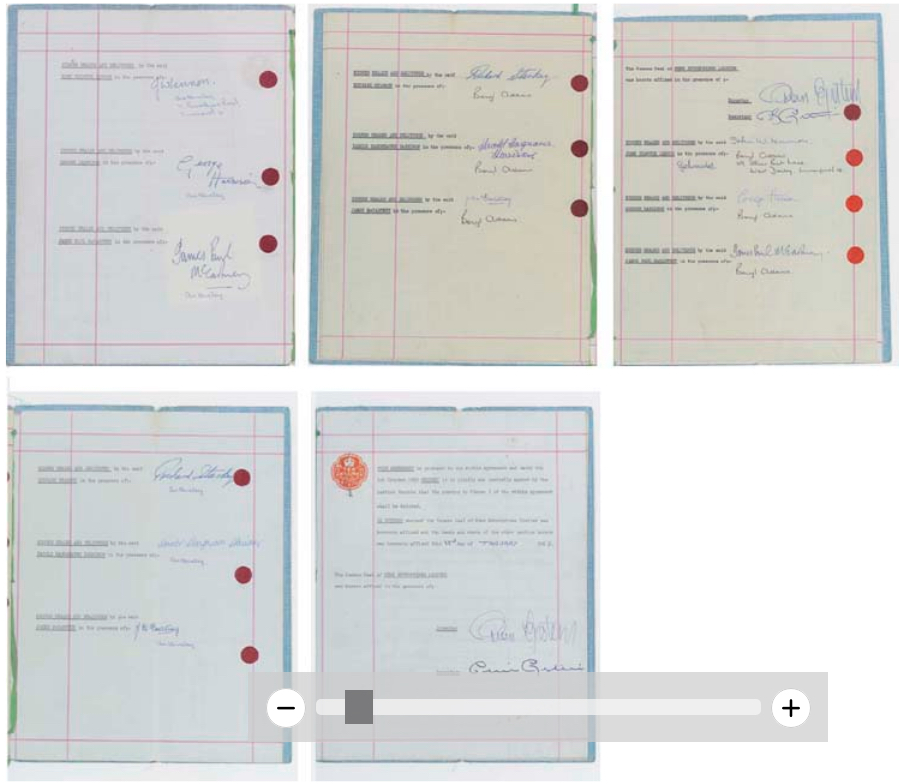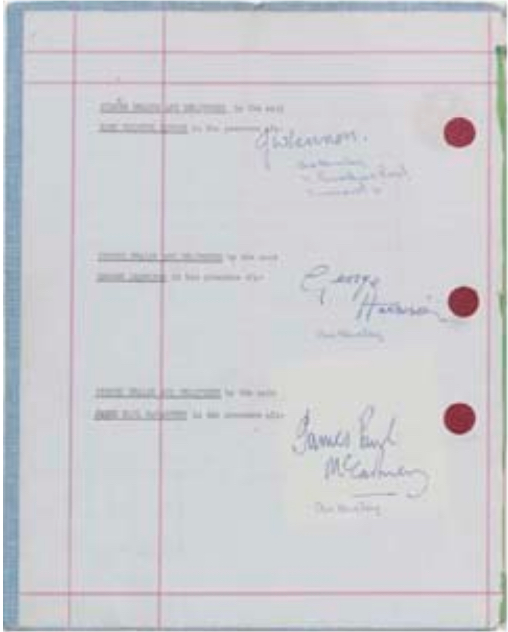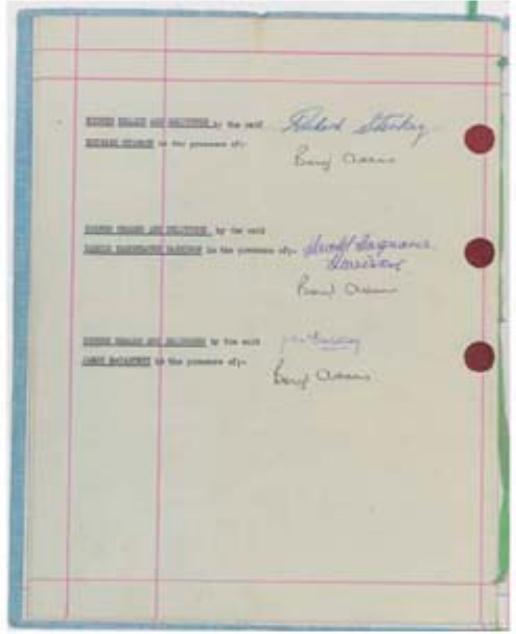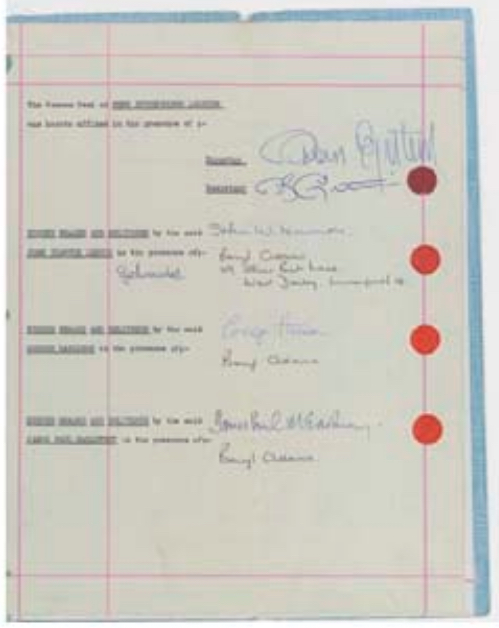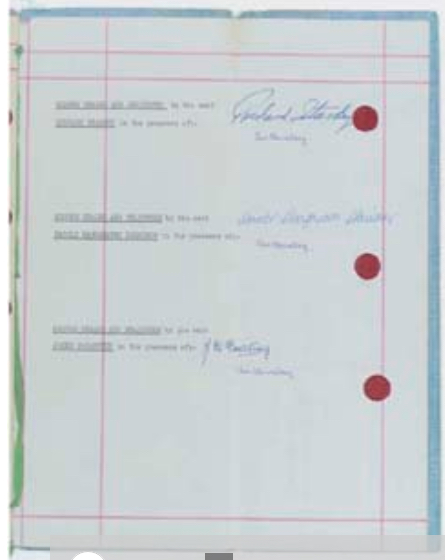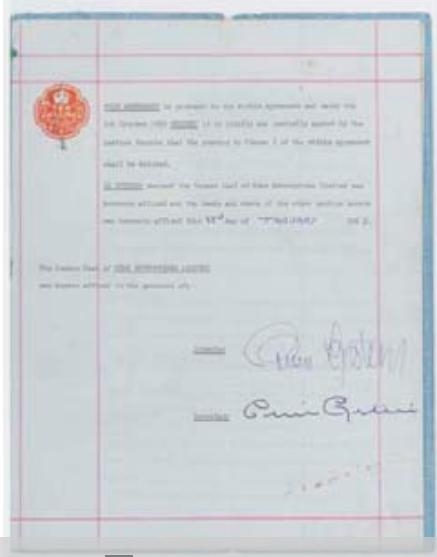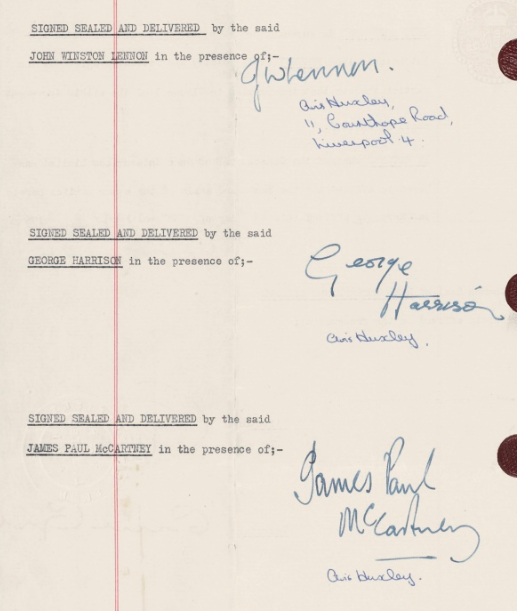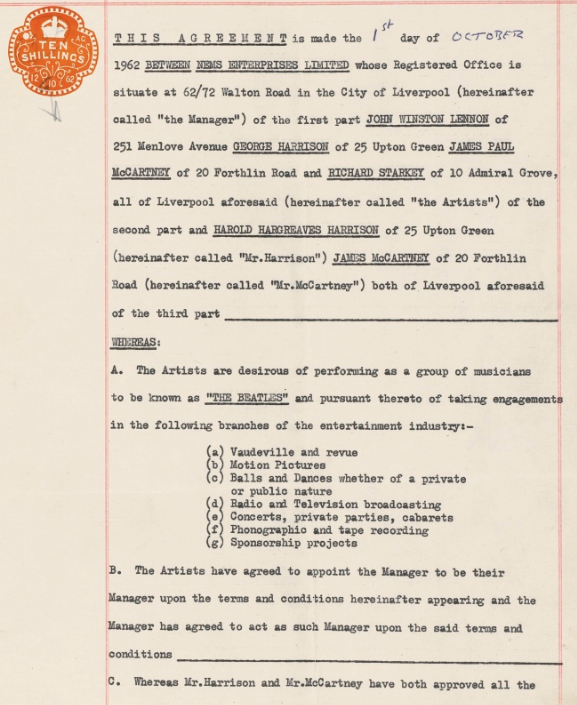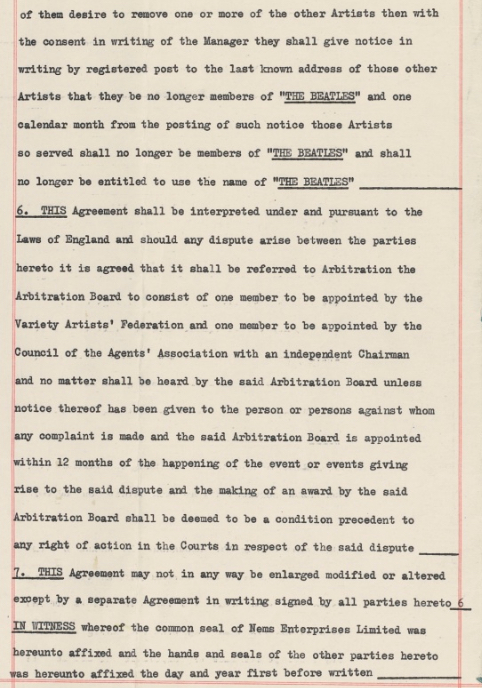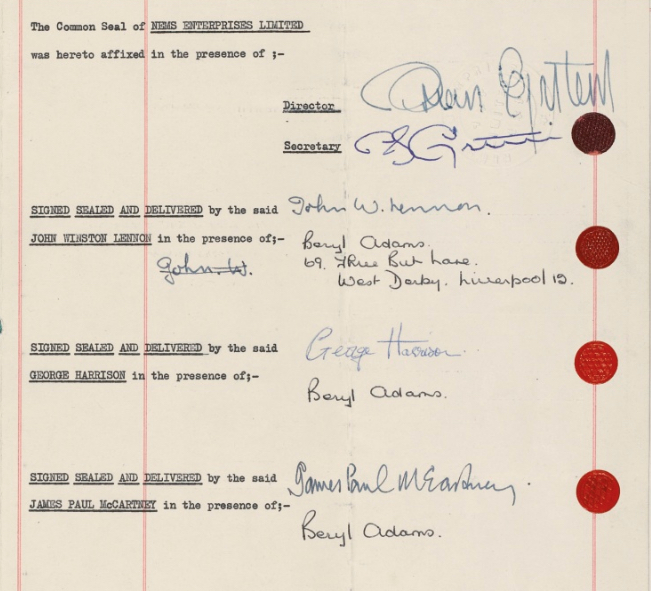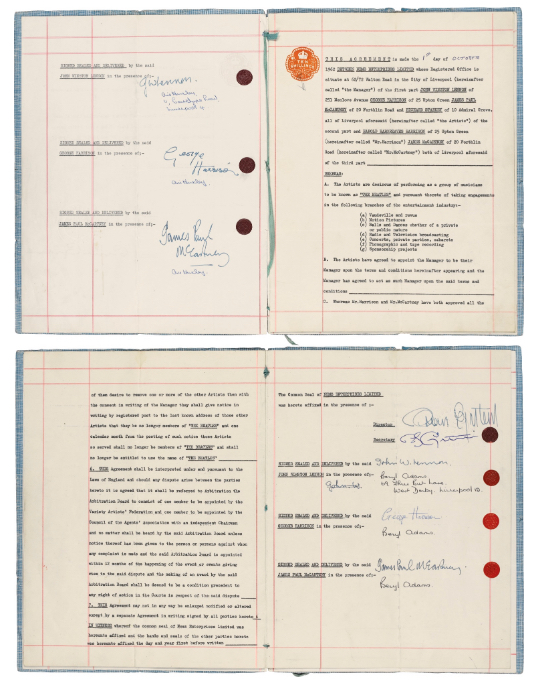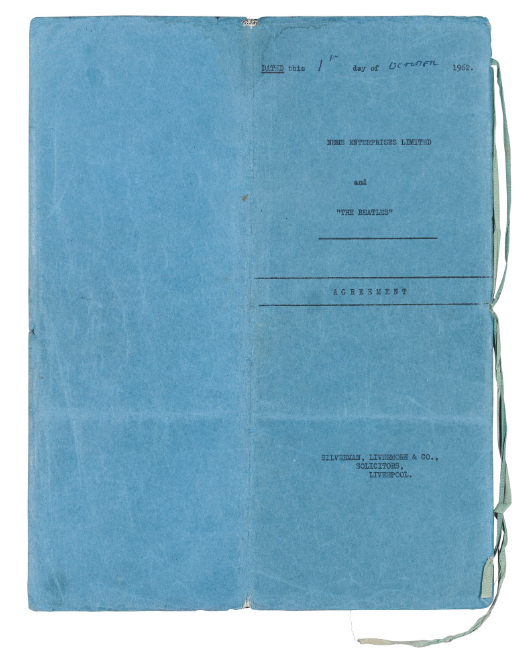Example Information:
A rare signed copy of the revised Management Agreement between The Beatles and Brian Epstein dated 1st October, 1962, four days before the release of the group's debut single, the eight-page document of mimeographed typescript, completed and signed in blue ink and ballpoint pen, the contract between: NEMS Enterprises Limited...The Manager and John Winston Lennon, George Harrison, James Paul McCartney and Richard Starkey..The Artists and secondly between Harold Hargreaves Harrison and James McCartney - George and Paul's fathers' approval of the agreement was necessary as both were under 21 years old - the terms of the contract being: - to appoint Brian Epstein ...to act as their Manager throughout the world...for a period of 5 years... under a proviso that either party could terminate the Agreement with a three month notice period in writing; - that as their Manager Epstein should: - ...undertake all necessary advertising and publicity for the Artists..; - advise ...on all matters concerning clothes, make-up and the presentation and construction of the Artists' acts and also on all music performed in the course of or in connection with such acts; - find employment for the group and to...guide and advise them in all matters concerning their professional interests; - arrange recording sessions; - negotiate all employment enquires; - employ sub-agents in any part of the world at his discretion by written agreement with them; - employ other performers to play with the The Beatles by written agreement with the group; By the terms of this Agreement, Epstein was employed to perform these services for The Beatles all over the world on the understanding that: - as a group or individually they would not engage another person or firm to act for them, nor would one of them act in capacity as Manager; as far as the finances were concerned The Beatles agreed: - to pay the Manager...25 of all moneys..received by them during the period of this Agreement... - the collection of the group's funds, the payment of expenses, the arrangement and agreement of any endorsements and accounting being Epstein's responsibility; - under the terms of this agreement provisions were also made should two or more members of the group decide to expell another; The Management Agreement signed in blue ink or ballpoint pen: Brian Epstein, John W. Lennon, George Harrison, James Paul McCartney, Richard Starkey, Harold Hargreaves Harrison and J.McCartney, each signature positioned above that of a witness, each also accompanied by a red wax seal, Lennon making two attempts at his signature, the first one incomplete John.W. and crossed out due to being incorrectly positioned beside the place designated for the witness' signature -- this document bound within a supplemental agreement dated 22nd January 1963, varying the terms of the contract of 1st October 1962, and removing the proviso to Clause 1 [that either party may terminate the Agreement by giving 3 months notice in writing..], the supplemental agreement also signed in blue ink as follows: Brian Epstein, J W Lennon, George Harrison, James Paul McCartney and Richard Starkey and in blue ballpoint by the two fathers Harold Hargreaves Harrison and J.McCartney
Example 2 Information:
SIGNED MANAGERIAL CONTRACT WITH BRIAN EPSTEIN, 1 OCTOBER 1962 mimeographed typescript contract between "Nems Enterprises Limited...The Manager" and John Winston Lennon, George Harrison, James Paul McCartney, and Richard Starkey (Ringo Starr) ("The Artists"), and also Harold Hargreaves Harrison and James McCartney, fathers of George and Paul respectively, agreeing to "appoint the Manager to act as such Manager throughout the world ... for a period of 5 years from the 1st day of October 1962", signed by Brian Epstein as company Director and Clive Epstein as company Secretary, then signed by all other parties including all four Beatles, witnessed by Epstein's secretary Beryl Adams, signed variously in blue ink, blue and black ballpoint (Lennon making two attempts having first begun his signature in the wrong place), each of signatures accompanied by a red wax seal, 8 pages, folio, with red ruled margins and ten shilling stamp, 1 October 1962; bound together with a supplementary agreement "pursuant to the within Agreement...whereby it is jointly and severally agreed...that the proviso to Clause 1 of the within agreement shall be deleted" (and this clause struck through in the main contract in pencil), again signed by Brian and Clive Epstein, Lennon, Harrison, McCartney, Starkey and the two fathers, 4 pages, folio, 22 January 1963; in a blue wrapper docketed by the solicitors' office on the lower cover ("Dated this 1st day of October 1962. Nems Enterprises Limited and "The Beatles" | Agreement | Silverman, Livermore & Co., Solicitors, Liverpool"), stab-stitched with green ribbon, each page with vertical fold down centre, wrappers worn at extremities.
The Artists are desirous of performing as a group of musicians to be known as 'The Beatles'..." “...I never thought that they would be anything less than the greatest stars in the world – and I mean that. I always knew that they were going to be tremendous … I sensed something big, if it could be at once harnessed and at the same time left untamed...” (Brian Epstein, quoted in Lewisohn, p.999) THE CONTRACT THAT BOUND TOGETHER THE BEATLES AND BRIAN EPSTEIN. This was the only management contract signed between The Beatles and Epstein after the band attained its final line-up, and was signed just before the release of their first single launched the band on the most incredible journey in pop music history. Without this contract, and the relationship it represents, it seems inconceivable that The Beatles could have achieved all that they did: it took more than inspired musicianship and song-writing to remake popular music, and the presentation, direction, and internal harmony of the Beatles all owed a huge amount to Brian Epstein. He was, as Paul McCartney has acknowledged, the Fifth Beatle and the band began to crumble after his sudden death in 1967. Lennon said "We loved him and he was one of us.” The story of Epstein's relationship with The Beatles is more of a romance than a cool business deal. The young Beatles had long known Epstein by sight as the manager of NEMS (North End Music Stores), but Epstein only became aware of the band when a fan asked him for a copy of 'My Bonnie', which featured The Beatles as backing. He soon tracked The Beatles down, and on 9 November 1961 visited the Cavern Club to hear them play. He was immediately caught by the powerful thrill that had buzzing fans queuing outside the Cavern; the energy and passion of their music, the sexual charisma, and the charm and wit with which they engaged with their audience. He returned every day for a week to hear them again, but from the very first time he heard their sound Epstein was determined to be the manager of The Beatles. Epstein had never managed a band before but he soon convinced them that he could do the job; he was, after all, a successful businessman, ran the best record shop in town, was smartly dressed, and had the wisdom of age (he was 27 years old). The Beatles agreed to take him on at a band meeting on 10 December 1961 and they signed their first contract with him at Pete Best's house on 24 January 1962. Epstein immediately set to work creating the look that would soon become famous around the world, smoothing away some of the band's rough edges (something which Lennon in particular would come to resent), and using his contacts to get them into a London recording studio. There were several reasons why a new contract was drawn up less than nine months later. Epstein's work was paying off: The Beatles now had a contract with EMI and their first record was about to be released, so it made sense to consolidate their relationship. Epstein had set up a new company to handle his new dealings as an impresario, NEMS Enterprises, and The Beatles' contract should properly be with that company rather than Epstein personally. But also, remarkably, Epstein had never actually signed the contract in January, for reasons that he explained in his autobiography, "even though I knew I would keep the contract in every clause, I had not 100% faith in myself to help The Beatles adequately. In other words, I wanted to free The Beatles of their obligations if I felt they would be better off." This gesture speaks of a love and belief in the band that was very different from the exploitative managers who, in Epstein's words, "knew more about a fast buck than does a slow doe". There had also been a change in the band's line-up since January. In August it had fallen to Epstein to tell Pete Best that he was to be replaced by Ringo Starr – even though the decision, principally taken because George Martin had found Best's drumming inadequate at their test recording in June, was really that of the other Beatles. The following month Best had appointed lawyers who threatened to sue Epstein for breach of contract, claiming that he was liable to provide him with paid engagements. Among the responses from Epstein's lawyers came the claim that, "With regard to The Beatles, there was no question of dismissal. Your client agreed to leave, and the group reformed itself" (p.1355). This claim that The Beatles had momentarily split up and reformed was another reason for a new contract and although the terms of the October contract were almost identical to those of the January contract a new clause was added that would prevent a similar law suit in the future. This allowed members of The Beatles to be kicked out, "should two or more of them desire to remove one or more of the other Artists … with the consent in writing of the Manager" (see Lewisohn, pp.1354-57). The contract was signed in Epstein's office in the NEMS shop and witnessed by his secretary, Beryl Adams. Paul and George were both under 21, so their fathers were also summoned to co-sign the contract. The contract appointed Epstein as the band’s manager for five years, revocable with three month’s written notice, for 10% commission on the Artists’ earnings up to £400 a week, 20% between £400 and £800, and 25% above that. The band’s reliance on Epstein is clear in the terms of the contract, which makes NEMS responsible for advertising and publicity, arranging performances and recording sessions, and advising “on all matters concerning clothes, make-up and the presentation and construction of the Artists' acts and also on all music performed in the course of or in connection with such acts”. There was also a clause allowing for the termination of the contract with three months notice, but on 22 January 1963 (by which time 'Please Please Me' was climbing inexorably up the charts), in a further gesture of mutual trust, all parties signed an amendment cancelling this clause. The Beatles had complete faith in Epstein to manage their affairs, promote the band, and steer their overall direction. This freed them to think about the music. Epstein's commission was high (although not in comparison to some other, more cynical, operators in the music world), but he was taking on more than a traditional manager, as he was to explain when challenged: "I act as manager as well as agent. Most acts have one of each - to whom, by the way, they pay separate commissions… [NEMS Enterprises] direct and guide and shape careers. We have our own experts. We run our own public relations division. These things cost a fortune if they are done in the right way. One's profits from that 25 are not really as fantastic as people imagine. Critics often forget that we have hefty outgoings just like any other firm." Perhaps the band could have found a cheaper manager, but they would never have found anyone who would commit to The Beatles with the fervency of Epstein. With the signing of this contract, Ringo newly in place on the drums, and their first recordings under their belt, The Beatles were ready to take on the world.

